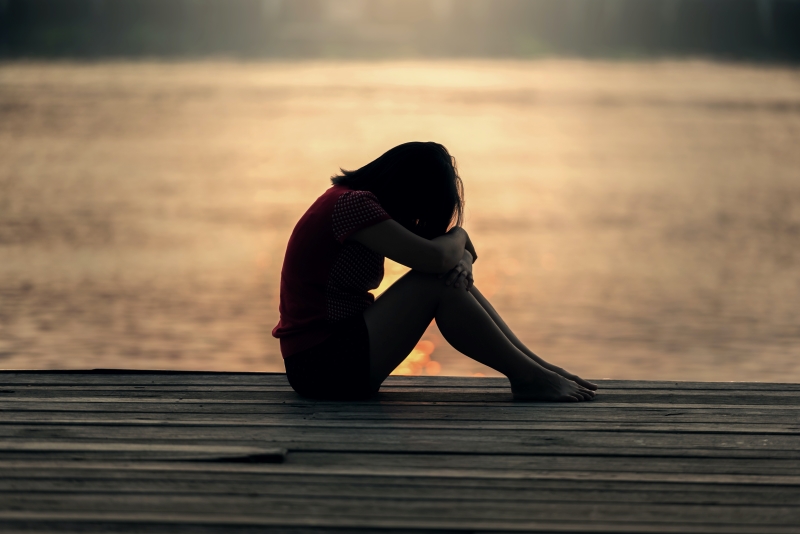11 things you should know about grief after miscarriage or baby loss

The aftermath of losing a baby during pregnancy is haunting. You have your precious baby inside you — and then the world comes to a halt, when you learn you’ve lost that part of you. There are very few words to explain the depth of despair that a woman goes through as she grapples with this devastating loss.
Grief after a miscarriage is the word most people use to attempt to label that feeling. It may seem too simple a word for such an immense shift in one’s life and being, but it may do for now.
In a book called A Deeper Shade of Blue by Dr. Ruta Nonacs, MD, she explained that grief is not just”‘feeling sad”: “It is a complicated, sometimes prolonged process by which you learn to cope with a loss and ultimately to move beyond it. The process of grieving requires time, patience and the support of others.”
When a woman goes through a miscarriage or stillbirth, the feeling of loss is real, yet intangible, invisible, because no one can actually see your “injury”. You have no bruise on the arm, no bleeding wound, no broken ankle to provide visual proof so people can fully understand your pain.
Women who have just suffered baby loss go through their everyday tasks, while hiding the trauma that no one can see. And with any loss, comes grief.
But really, how does one navigate through this life-changing loss? What do we know about grief after a miscarriage, and what else do we need to know about it?
For the phenomenal women who are only beginning to get through each day after a miscarriage, this list is for you. If you have a friend or a relative who is trying to manage the unfamiliar feelings that surround pregnancy loss, this list is important to you, too, so that you can support them through this difficult time.

Grief is a process that everyone who has ever lost a loved one must go through. It is part of the chain of emotions — from shock, denial, anger, to bargaining, deep sadness, depression, and finally, acceptance — that may follow such loss in order for the healing to begin.
Grief felt after losing someone you‘ve never even held or seen in the flesh IS valid and as real as it can be. So yes, you are allowed to grieve and f1. eel the worst. But it’s important you get the support you need while you’re grieving, so that you’re not dealing with this powerful emotion all alone.
Because we are all unique, we handle a multitude of emotions in our own way. While some feel deep despair after a loss, others are able to bounce back to their usual routine only days after their miscarriage.
This does not mean that one is better than the other at handling grief. There is no “correct” or “proper” way to feel about it. It’s just that each of us come from different emotional places, and so we may have different grief reactions.
So if you feel grounded and undaunted, ready to move on, it is okay. If you have a more intense reaction and go through prolonged periods of pain, it is okay, too. Both are valid and appropriate. Remember: no one gets to tell you how you feel except you.
Know that the crushing pain you are feeling is not necessarily depression — although it could be. According to medical experts, pregnancy brings about a significant shift in hormones that affect your brain chemistry, and so does miscarriage.
Grief is a very normal reaction to any kind of loss, while depression requires medical treatment. It can be confusing to sort out if it is grief or depression that you are feeling. Women may need help in differentiating between grief and depression, and in figuring out when to seek particular help.
Grief and depression are not one and the same, and each requires a particular way of support, attention and treatment, medical or otherwise.
It is when grief gets complicated and unresolved that it crosses the line and skips over to depression and anxiety. Doctors at Mayo Clinic marks postpartum depression at two weeks after childbirth, and feeling depressive symptoms after that time calls for professional help.
According to research, grief and depression after a miscarriage may last up to 1 year. When you continue to feel debilitated by the pain, guilt, and shame for a longer period of time, and suicidal thoughts begin to take over, clinical depression or anxiety could be suspected.
Make sure that support is sought when pain is becoming unbearably intense.
There are specific experts who deal with and understand postpartum depression or PPD, and there are others who understand and treat grief from a miscarriage.
Be careful in determining the kind of support you seek, as some particular concerns in depression are actually normal ways of handling grief, such as sleeping for long hours, according to Dr. Nonacs’ book.
Certain behaviors have conflicting meanings or importance depending on whether it is viewed as PPD, grief, or a combination of the two. “It takes some real attention to treat them both,” explains Dr. Nonacs. She adds that depression can impede recovery if not treated; grief can exacerbate pre-existing conditions like anxiety and depression if support is not given.
Keep in close contact with someone who can help monitor your grief and watch out for signs of depression. Getting support is key in the healing process.
With the desire to be left alone after suffering a miscarriage or stillbirth, relationships take the flack. Whether intended or not, women are likely to isolate themselves physically and emotionally which is only helpful up to a certain extent.
Sometimes grief lasts longer than one would expect, and we simply cannot rush the grief process. Reconnecting with family and close friends, and most importantly, the husband or partner is imperative, after spending time in solitude.
Women suffering from grief after a miscarriage should let the people around them know what they need to hear, what could help somehow. The distance from others should not be allowed to stay as is. Bridge the gap, allow people in.
Families and friends cannot just give up in trying to reach out. Give the women the space, but never stop checking up on them (and their husbands, too).
ALSO READ: Pregnancy after miscarriage: What you should know if you're conceiving again
Men and women deal with their grief after a miscarriage differently. Truth is, women may feel more intense emotions because they went through the pregnancy and the loss physically. And while women want men (and vice versa) to understand what they are going through, they may not.
Giving space for one’s own process is the first step, but communication and reconnection should not lag behind. Couples should not take too long to talk, to help each other heal. If you are not connecting, seek the help of a counselor who can help you get through this devastating experience together.
And with all their good intentions and genuine love, people never really know what to say.
They sometimes end up blurting out something that feels insensitive, “judgy” and “preachy”, or just downright hurtful”: At least you’ve got your husband, You’re young… you can still have more babies, Next time, you’ve got to be more careful.
As a result, women often feel even more alone. Finding other women who have similarly suffered a pregnancy loss can be incredibly helpful in one’s healing process. Empathy is much-needed, and this can be found in grief-based support groups — with others who have also lost a child to miscarriage.
This would be a safe place for women to open up about their feelings and begin to trek the road to emotional healing.
With that said, know, too, that not everyone can really help. Be aware that some people have their own issues and insecurities about loss and tragedy, and these may cloud their good intentions. It is great to have friends and family who can truly help, but it is also important to keep your distance from those who can only hurt your vulnerability and sensitive state.
A friend’s birth announcements, pregnant women, babies, children’s birthday parties, the doctor’s office, songs and ads about babies and baby items — these are the most common emotional triggers.
Breaking into sobs when these triggers come up is completely normal. Let it all out , but find a way to pick up the pieces again and claim your peace back.
With grief comes an unrecognisable feeling of emptiness and numbness. Going through the entire postpartum experience and then the pregnancy loss takes women to a kind of identity shift — when they do not feel that “mother’s instinct” all of a sudden.
As if it went away, along with the baby. How can I feel like a mom again, when the only reason for that has been taken away from me? Recognize this wretched, soul-crushing anxiety, but do not stay in that place.
It is a valid emotion, but bear in mind that you are a mother once, and you will always be, whether the world sees it or not.
ALSO READ: What causes multiple miscarriages: Tests, risk factors and treatments
Finding a way to memorialise the loss of a baby through a ritual or a project is a beautiful way that can help couples can help work through their grief and loss. Some parents plant a tree, others make a scrapbook, write a poem or begin a blog.
Some have memorial tattoos so they have a visual remembrance of their loss. It is important to know and feel that healing is possible, and that after feeling empty for a long time, you can be whole again. It is okay to decide to move forward and maybe think of getting pregnant again.
Regaining strength does not mean walking away from the tragic loss of that baby. The pregnancy and the loss will always be a part of you, but there is no need to keep on grieving. It is okay to feel happy again.
ALSO READ: Late miscarriage: How to help a mum-to-be cope with the distress
With time, anyone who has suffered from a perinatal loss will move toward acceptance and will be able to spring back up and live again. The pain will not be completely gone, but the emptiness and feeling of failure and every ounce of negativity will fade gradually, and you will heal.
Remember that the only way to get some support, is to ask for it. The pain is only invisible if it is held in and held back for only you to see and experience. Grief after miscarriage is only invisible if no one talks about it. So share your grief after a miscarriage, look for a support system, and start to heal.
